
As we age, our bodies undergo various changes that can impact our overall health and wellness. Exercise is a powerful tool that can help mitigate many of these changes and even reverse some of the effects of aging. In this blog post, we will explore the importance of exercise for seniors and offer tips on how to start a safe and effective exercise routine. So, if you're wondering how to stay fit and healthy in your golden years, keep reading!
Exercise is not just about physical health; it's about mental well-being, social connections, and overall quality of life. For seniors, regular physical activity is essential because it helps maintain healthy blood pressure, keeps harmful plaque from building up in the arteries, reduces inflammation, and improves blood sugar levels. It also strengthens bones and helps stave off depression. Moreover, regular physical activity can improve sleep quality, reduce the risk of certain cancers, and is linked to longer life.
Many older adults hesitate to start exercising because they’re unsure about what’s safe and effective. But the good news is that any movement is better than none. Starting small and gradually increasing your activity is a perfect approach. Aim for at least 150 minutes of moderate-intensity activity per week. If that sounds daunting, don't worry! You can work your way up to it. Besides structured exercise, staying active throughout the day—like taking the stairs, doing yard work, or playing with your grandkids—also counts.
There are many types of exercise suitable for seniors, each offering unique benefits:
The amount of exercise seniors need depends on several factors, including their current fitness level, goals, and any specific health conditions. The American Heart Association recommends at least 150 minutes of moderate-intensity aerobic exercise per week, plus strength training exercises at least two times per week. Stretching exercises can be done daily, and balance exercises should be done three times a week.
If you’re just starting, try breaking this into more manageable chunks. You might aim for five 30-minute sessions per week or even shorter, more frequent sessions if that suits your schedule better. Remember, the key is consistency and gradual progression.
The benefits of exercise for seniors are numerous and wide-ranging. Regular physical activity can help:
Starting an exercise routine can be intimidating, but here are some tips to help you get started:
Seniors often face barriers to exercise, such as lack of time, motivation, fear of injury, and lack of access to facilities. Here are some strategies to overcome these barriers:
Many seniors have excuses for not exercising, such as "I'm too old," "I'm not fit enough," or "I don't have time." However, these excuses can be overcome by starting slowly, finding enjoyable exercises, and making exercise a priority. Remember, it's never too late to start.
Consistency is key when it comes to exercise. Aim to exercise at least three times a week, with at least one day of rest in between. Regular exercise will help you:
Exercise is just one part of the equation for overall health; nutrition is equally important. Aim to eat a balanced diet that includes plenty of fruits, vegetables, whole grains, and lean protein sources. Stay hydrated by drinking plenty of water. Adequate nutrition supports muscle growth and repair, improves energy levels, and reduces the risk of chronic diseases.
Group fitness classes can be a fantastic way to stay motivated and accountable. By joining a group, you can:
Always listen to your body and take rest days as needed. Exercise should not be painful or uncomfortable. If you experience any pain or discomfort, stop immediately and consult with your doctor. Remember, it’s okay to rest and recover.
Exercise is a crucial component of overall health and wellness, especially for seniors. By incorporating regular physical activity into your daily routine, you can improve your quality of life, maintain independence, and reduce the risk of falls and injuries. So, why not get started today? Consult with your doctor, find an exercise buddy, and begin with short, gentle exercises. Remember to listen to your body and take rest days as needed. Consistency and patience can unlock the secret to a longer, healthier life.
Stay active, stay healthy, and enjoy every moment of your golden years!
Fill the form below to request for 1-on-1 free demo
